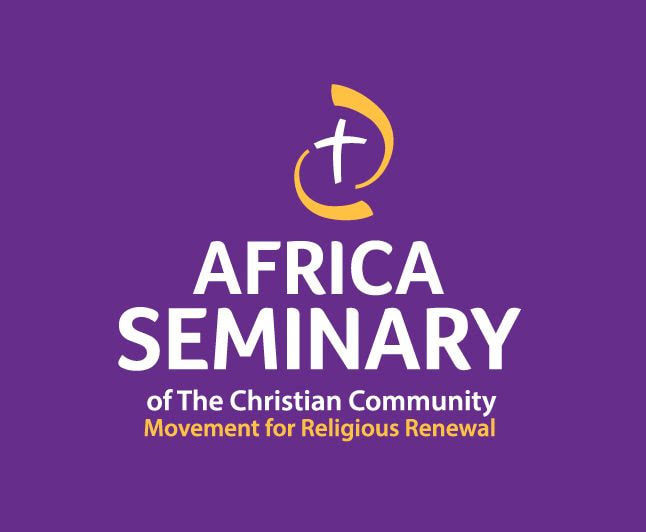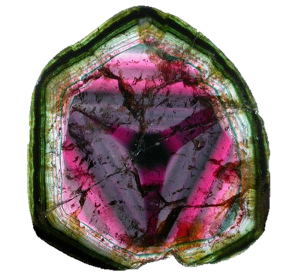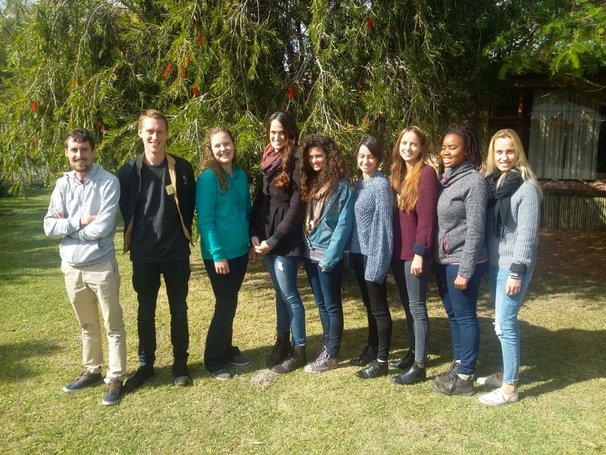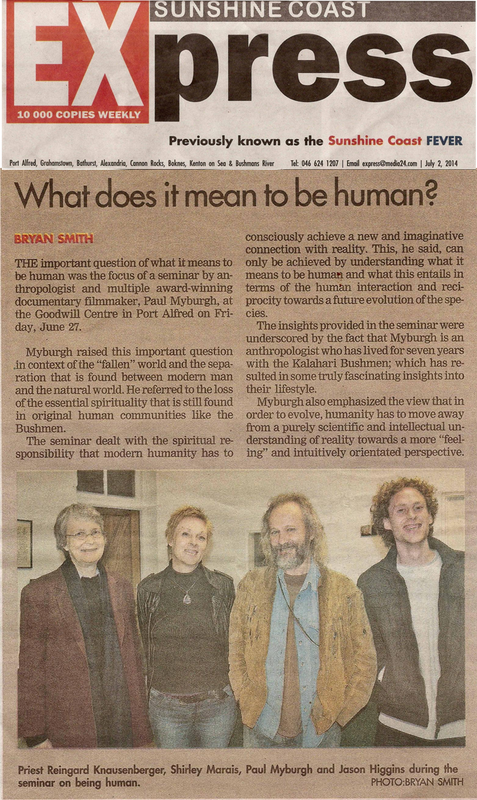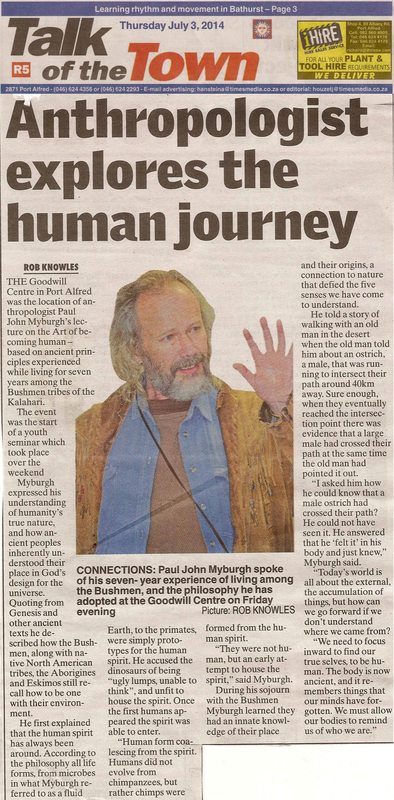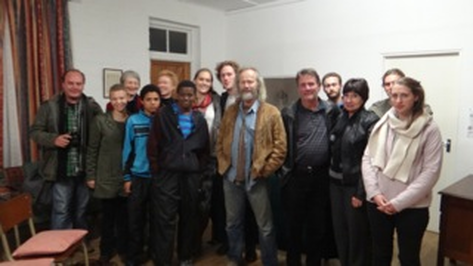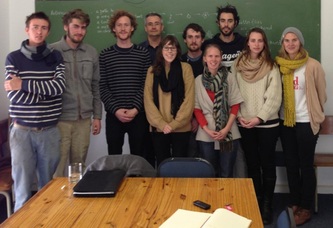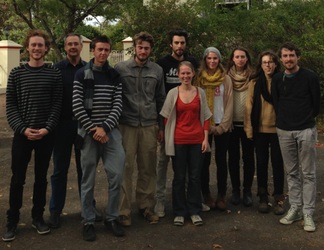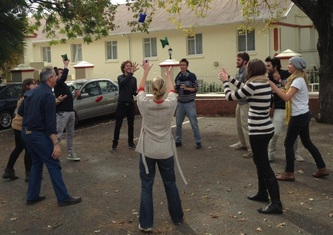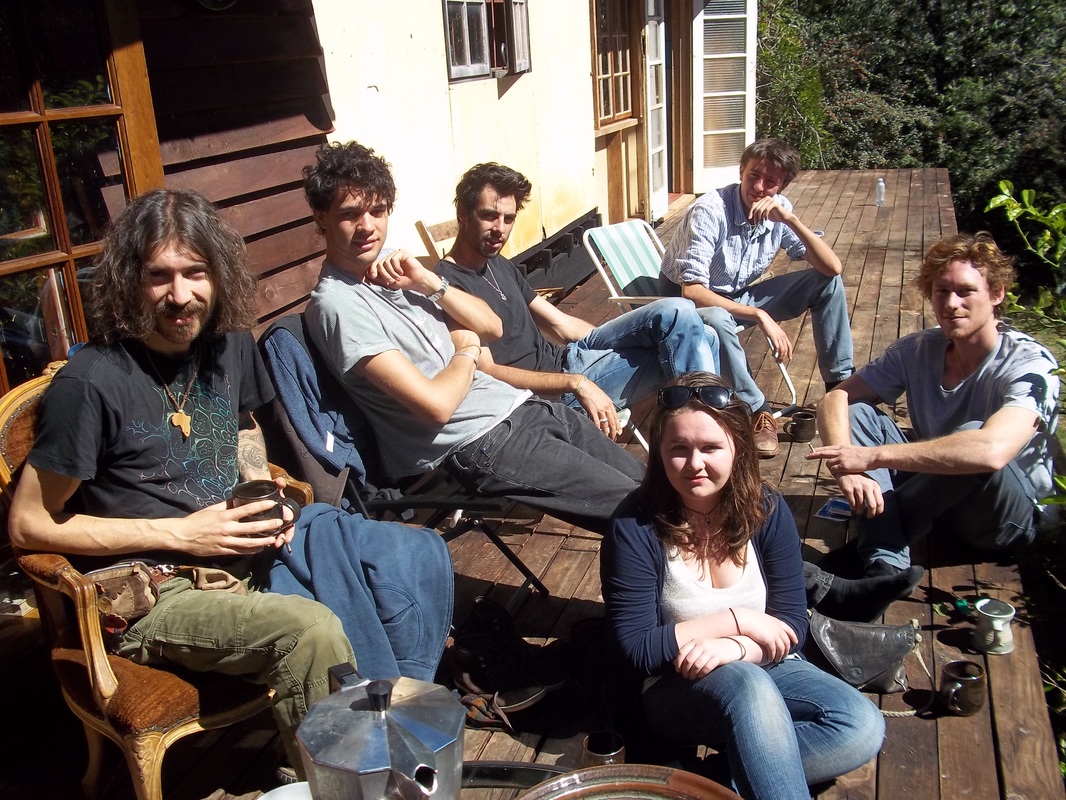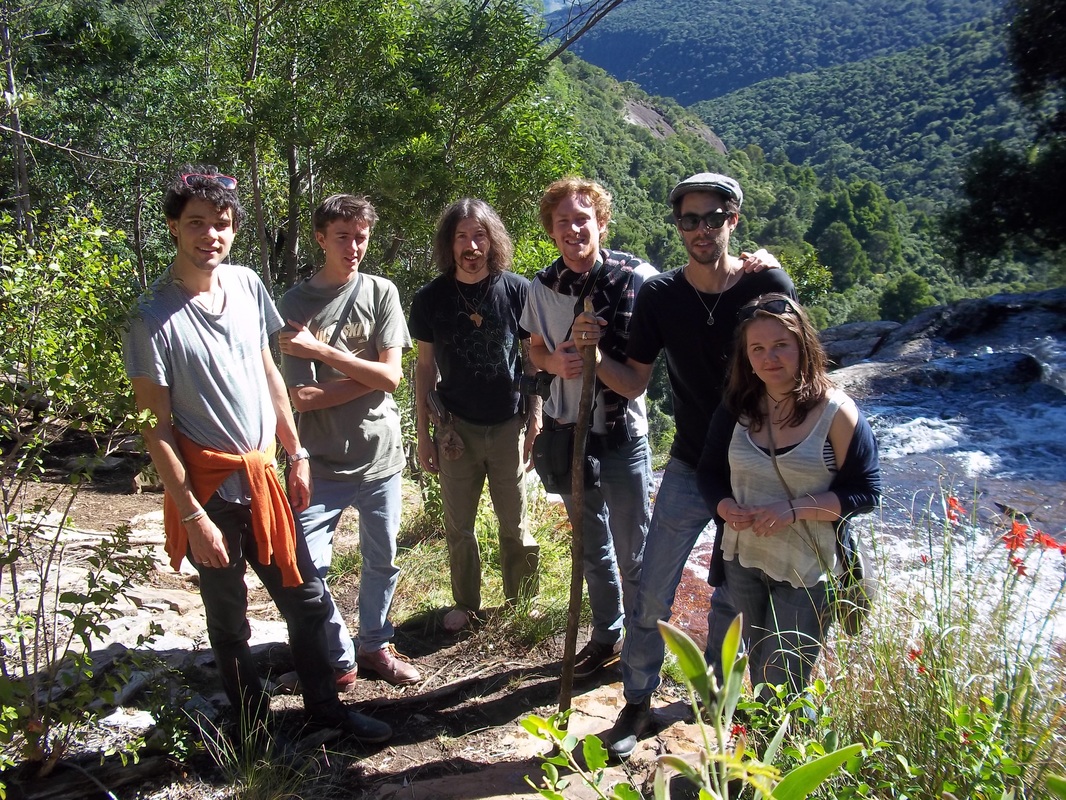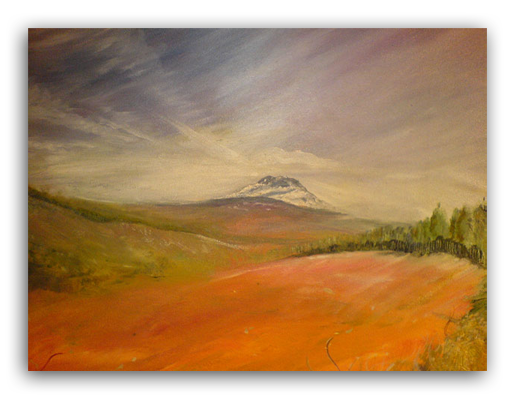Previous Sessions
- The Africa Seminary at Wellspring Uncapped in Cape Town, April 2015
- The Africa Seminary in Johannesburg - Our Life as a Journey, January 2015
- The Art of Becoming Human, June 2014
- Seminar, Hogsback, June 2013
- Student Conference, Hogsback, April 2013
- Donation from Germany in June 2012
- The Creation of Meaning - the first Semester & My personal experience by David Nurse
- "Creating Meaning - finding our own creed" by Lisa Yiadom, Samuel Mirkin, Cornelius Schubert and Jason Higgins
The Africa Seminary meeting alongside Wellspring Uncapped in Cape Town, April 2015
The participants in the Wellspring Uncapped Africa Seminary session
The Africa Seminary in Johannesburg - Our Life as a Journey, January 2015

by Rev. Reingard Knausenberger
For the first time, our seedling seminar was held in Randburg from 15th-18th January 2015 with all in all eight young people. The Theme for this first seminar in 2015 was Our Life as a Journey -- is there a map for it? The focus was on transition points and what happens there, and how thresholds in life offer opportunities to grow and expand in consciousness. While as a child this seems to happen 'by itself', we realise that as adults maturing only happens if we participate and in fact, take charge of our further development.
Karin von Schilling and David Wertheim Aymes thankfully made time to come and share their knowledge and experience of living life from the source of Anthroposophy, both personally and professionally. Karin in particular let Rudolf Steiner come alive as a seeking, striving human being who also had to wrestle with himself and find his way through hard inner work.
The next seminar will be in Cape Town from 1st - 3rd May, interwoven with the Wellspring Uncapped - Receiving Light from the Future conference, but also with certain activities independent of it. The guiding theme will be: Forming Community and Standing as an Individual - what is preventing us from moving forward?
The next seminar will consider the theme: Commitment and Purpose in Life, Finding Direction.
For the first time, our seedling seminar was held in Randburg from 15th-18th January 2015 with all in all eight young people. The Theme for this first seminar in 2015 was Our Life as a Journey -- is there a map for it? The focus was on transition points and what happens there, and how thresholds in life offer opportunities to grow and expand in consciousness. While as a child this seems to happen 'by itself', we realise that as adults maturing only happens if we participate and in fact, take charge of our further development.
Karin von Schilling and David Wertheim Aymes thankfully made time to come and share their knowledge and experience of living life from the source of Anthroposophy, both personally and professionally. Karin in particular let Rudolf Steiner come alive as a seeking, striving human being who also had to wrestle with himself and find his way through hard inner work.
The next seminar will be in Cape Town from 1st - 3rd May, interwoven with the Wellspring Uncapped - Receiving Light from the Future conference, but also with certain activities independent of it. The guiding theme will be: Forming Community and Standing as an Individual - what is preventing us from moving forward?
The next seminar will consider the theme: Commitment and Purpose in Life, Finding Direction.
|
|
by Elisa Kirigin
The theme for this Africa Seminary was the journey of our life, and the willfulness to direct it with a focus in mind. Facilitated by Reingard, we began by reflecting on and creatively depicting the major thresholds in our lives up until the present moment, so as to explore our journey so far. The course of the life of a human being is made up of thresholds-events of preparation which are followed by moments of new awakenings. Up until a certain point, these thresholds have been influenced by and developed by guides, but at this stage we come to realise that we need to do the work to cross the present threshold to progress on our life journey. The question then arises: “do I want to work?” Through this we understand that inner work is challenging in that a spiritual journey has to be continuously and actively worked upon. The Act of Consecration of Man is an example of the progression of such a path.
The group was led into the main concept of thinking and the understanding of the “I” as the spiritual self. We also explored how feeling (soul) and willing (physical) form the innate foundations of man and how these aspects complement each other. Every physical manifestation, for example, is the result of ideas and thinking which are spiritual. Through Karen von Schilling’s sharing, our group was privileged to gain a deeper insight into the life and work of Rudolf Steiner, an initiate who overcame the struggle to bridge the gap between the spiritual world, which we access through thinking, and the material world, which we access through our senses. Through his various applications of Anthroposophy we learn that these principles are not merely abstract nor hidden ideas but heal both the inner and the outer selves. This idea was further reinforced by David Wertheim-Aymes’ discussion on how Steiner’s values have successfully developed his business, by altering the focus from material capitalistic gain to a directed attention on the proper completion of procedures. For these processes to occur, a fluctuating shift in inward and outer perception is required.
Over the four days, the discussions were accompanied by practical, calming and very enjoyable activities, such as wet on wet painting, crayon drawing, a representation of our life’s map and mirror writing exercises. These helped us to understand,and have a general feeling towards, the topics we covered.
Although I presently do not feel that I am fully ready to engage in such inner work, overall this was a beneficial experience, which I hope will serve in the future.
The theme for this Africa Seminary was the journey of our life, and the willfulness to direct it with a focus in mind. Facilitated by Reingard, we began by reflecting on and creatively depicting the major thresholds in our lives up until the present moment, so as to explore our journey so far. The course of the life of a human being is made up of thresholds-events of preparation which are followed by moments of new awakenings. Up until a certain point, these thresholds have been influenced by and developed by guides, but at this stage we come to realise that we need to do the work to cross the present threshold to progress on our life journey. The question then arises: “do I want to work?” Through this we understand that inner work is challenging in that a spiritual journey has to be continuously and actively worked upon. The Act of Consecration of Man is an example of the progression of such a path.
The group was led into the main concept of thinking and the understanding of the “I” as the spiritual self. We also explored how feeling (soul) and willing (physical) form the innate foundations of man and how these aspects complement each other. Every physical manifestation, for example, is the result of ideas and thinking which are spiritual. Through Karen von Schilling’s sharing, our group was privileged to gain a deeper insight into the life and work of Rudolf Steiner, an initiate who overcame the struggle to bridge the gap between the spiritual world, which we access through thinking, and the material world, which we access through our senses. Through his various applications of Anthroposophy we learn that these principles are not merely abstract nor hidden ideas but heal both the inner and the outer selves. This idea was further reinforced by David Wertheim-Aymes’ discussion on how Steiner’s values have successfully developed his business, by altering the focus from material capitalistic gain to a directed attention on the proper completion of procedures. For these processes to occur, a fluctuating shift in inward and outer perception is required.
Over the four days, the discussions were accompanied by practical, calming and very enjoyable activities, such as wet on wet painting, crayon drawing, a representation of our life’s map and mirror writing exercises. These helped us to understand,and have a general feeling towards, the topics we covered.
Although I presently do not feel that I am fully ready to engage in such inner work, overall this was a beneficial experience, which I hope will serve in the future.
The Art of Becoming Human - Seminar in Port Alfred, June 2014
by Jason Higgins, Grahamstown
The latest addition of the African Seminary took place in the coastal town of Port Alfred in the Eastern Cape from the 27th to the 29th of June. The topic for the Seminar was “The Art of Becoming/Being Human”. Of the nine participants, five came from Rhodes University in Grahamstown, one from Johannesburg, one from Pretoria and two from Port Alfred.
The Seminar began with a public lecture given by Paul Myburgh, which was attended by some locals from Port Alfred, bringing the audience up to eighteen. The lecture covered everything from the history of modern man to the history and origin of the universe, broadly looking at what it is that essentially makes a being humane.
The next day the participants were given the opportunity to discuss, with Paul, some of the ideas which had been touched on in the talk. Paul then departed from the Seminar and we were joined by Michael Merle who picked up the strands from were Paul had left off.
Through methods of Goethean observation, exercises around conversation and much fun throwing bean bags the participants worked through many ideas around what it means to be human and how important it is that we become aware of the fact that it is a task to achieve and not a given. For those participants of the Seminar without any grounding in Anthroposophy the finale session on Sunday was spent looking at the Anthroposophical picture of the human being.
Throughout the Seminar the participants were accompanied by Reingard Knausenberger, who spent most of her time between sessions answering as many questions from the participants as time allowed for and generally keeping things moving and also organised.
The African Seminary is now in its fourth year and plans are being made for the African Seminar to take a new step, which might happen in Johannesburg in 2015.
The latest addition of the African Seminary took place in the coastal town of Port Alfred in the Eastern Cape from the 27th to the 29th of June. The topic for the Seminar was “The Art of Becoming/Being Human”. Of the nine participants, five came from Rhodes University in Grahamstown, one from Johannesburg, one from Pretoria and two from Port Alfred.
The Seminar began with a public lecture given by Paul Myburgh, which was attended by some locals from Port Alfred, bringing the audience up to eighteen. The lecture covered everything from the history of modern man to the history and origin of the universe, broadly looking at what it is that essentially makes a being humane.
The next day the participants were given the opportunity to discuss, with Paul, some of the ideas which had been touched on in the talk. Paul then departed from the Seminar and we were joined by Michael Merle who picked up the strands from were Paul had left off.
Through methods of Goethean observation, exercises around conversation and much fun throwing bean bags the participants worked through many ideas around what it means to be human and how important it is that we become aware of the fact that it is a task to achieve and not a given. For those participants of the Seminar without any grounding in Anthroposophy the finale session on Sunday was spent looking at the Anthroposophical picture of the human being.
Throughout the Seminar the participants were accompanied by Reingard Knausenberger, who spent most of her time between sessions answering as many questions from the participants as time allowed for and generally keeping things moving and also organised.
The African Seminary is now in its fourth year and plans are being made for the African Seminar to take a new step, which might happen in Johannesburg in 2015.
|
|
|
|
by Gwyn, Duncan and Paddy, students at Rhodes University
Before attending the weekend we were not quite sure what Anthroposophy was. It was quite an enlightening experience to explore some new perspectives on what it means to be human in today's modern social context. Through Paul's talks we explored some interesting strategies for improving everyday human communication. It was interesting to engage with life experiences and ideas of humanity from a perspective of story-telling, drawing on the ideas of the archetypal human experience as Paul presented it from his experience with the Bushmen and from anthroposophical concepts.
Michael's hands-on engagement was most refreshing, with valuable skills and activities- such as the versatile bean-bag throw and catch- and then looking into multiple modes of communication as well as noticing the importance of silence, listening and observing. Reflecting on the world around us and seeing that which appears normal from a fresh perspective was most inspiring and realising there is truly an Art to becoming human.
Before attending the weekend we were not quite sure what Anthroposophy was. It was quite an enlightening experience to explore some new perspectives on what it means to be human in today's modern social context. Through Paul's talks we explored some interesting strategies for improving everyday human communication. It was interesting to engage with life experiences and ideas of humanity from a perspective of story-telling, drawing on the ideas of the archetypal human experience as Paul presented it from his experience with the Bushmen and from anthroposophical concepts.
Michael's hands-on engagement was most refreshing, with valuable skills and activities- such as the versatile bean-bag throw and catch- and then looking into multiple modes of communication as well as noticing the importance of silence, listening and observing. Reflecting on the world around us and seeing that which appears normal from a fresh perspective was most inspiring and realising there is truly an Art to becoming human.
Seminar, Hogsback, June 2013
by Dominic Corbett
I had the fortunate opportunity of attending a seminar organised by Reingard on behalf of The Christian Community to study Rudolf Steiner and his ideas. The group consisted of eight students, mostly from Rhodes university, and Johnny and myself who are on a gap year from the UK. The seminar was lead by Michael Merle, a teacher at the Durban Waldorf School who facilitated the course brilliantly.
The group was mixed with some having no background in a Anthroposophy and others like me who have been to a Steiner School and been involved in The Christian Community. However, despite my Steiner upbringing I lacked a basic understanding of Anthroposophy. This seemed to be a common question living among the group, as well as how to make a vocation your occupation. These two themes formed the basis for the first public lecture of the seminar.
Over the next two days we, as a group, covered a huge amount of ground becoming more comfortable and familiar with the often hard to comprehend concepts in Anthroposophy. As the seminar progressed more and more questions arose and what struck me was the willingness within the group to engage very deeply and maturely with the content.
I was also very impressed with Michael's ability to work with whatever questions or thoughts the group had and I felt that Michael was able to draw on many years of life experience thus being able to give very insightful answers which got to the very root of our questions.
For me this seminar completely changed my attitude towards life and affected the way I see the world. From what I gather the rest of the group found this seminar very important and useful in dealing with life's challenges.
Many thanks to Reingard, Michael Merle, Sam Mirkin and Jason Higgins for helping to organise and bring this seminar about.
I had the fortunate opportunity of attending a seminar organised by Reingard on behalf of The Christian Community to study Rudolf Steiner and his ideas. The group consisted of eight students, mostly from Rhodes university, and Johnny and myself who are on a gap year from the UK. The seminar was lead by Michael Merle, a teacher at the Durban Waldorf School who facilitated the course brilliantly.
The group was mixed with some having no background in a Anthroposophy and others like me who have been to a Steiner School and been involved in The Christian Community. However, despite my Steiner upbringing I lacked a basic understanding of Anthroposophy. This seemed to be a common question living among the group, as well as how to make a vocation your occupation. These two themes formed the basis for the first public lecture of the seminar.
Over the next two days we, as a group, covered a huge amount of ground becoming more comfortable and familiar with the often hard to comprehend concepts in Anthroposophy. As the seminar progressed more and more questions arose and what struck me was the willingness within the group to engage very deeply and maturely with the content.
I was also very impressed with Michael's ability to work with whatever questions or thoughts the group had and I felt that Michael was able to draw on many years of life experience thus being able to give very insightful answers which got to the very root of our questions.
For me this seminar completely changed my attitude towards life and affected the way I see the world. From what I gather the rest of the group found this seminar very important and useful in dealing with life's challenges.
Many thanks to Reingard, Michael Merle, Sam Mirkin and Jason Higgins for helping to organise and bring this seminar about.
Living an Effective Life: Finding Vocation in Occupation. An Anthroposophical View.
by Gemma Garman
Before Michael Merle conducted the public talk for the weekend long seminar an initial discussion took place between those of us attending the seminar. It was at this point that I started to feel out of my depth a bit as the other members of our group quite obviously had a better understanding of who Rudolf Steiner was and what his thoughts and theories were, as well as a better understanding of Anthroposophy. This was the fourth in a series of seminars which dealt with a similar subject matter, all of which had been attended to some degree by the other members of the group. Questions were being asked like, “How does one lead an effective life?” “What is it in us that leads us down certain paths?” “Are we born with something in us that determines the life we choose?” Coming from an atheist background and never really being entirely convinced by any religion or spiritual school of thought that I had come across, I had given little consideration to questions like this. As soon as the public talk started I was immediately put at ease, however, and found myself feeling far more comfortable with the subject matter at hand. Michael began the talk by giving a description of who Rudolf Steiner was, where Steiner came from and how he began to lecture on the way in which he perceived the world and the way in which we as human beings could go about living in the world.
This lead into a description of what Anthroposophy was. It wasn’t defined for us, as throughout the weekend we were to come to our own understanding of what it was, but we were given a broad description of what Anthroposophy looks at. Certain aspects really stood out for me here: an encouragement to see the world, from my perspective, differently, an encouragement to discover the ideas and theories put forth before us for ourselves and to question and investigate these notions, the practical application engrained in every single idea put forth by Rudolf Steiner and in Anthroposophy, as well as the emphasis on “humanising” our existence and finding a human expression and consciousness. Michael reminded us throughout the talk that we determine how we live our lives and that Steiner at no point claimed to have the ultimate answers or facts, but rather encouraged each individual to question him and to interrogate his ideas. This in itself was so appealing to me, as throughout my upbringing I have been confronted by many people telling me what I should believe and what the ultimate truth is. A person who encourages us to discover meaning for ourselves has a far better understanding of how human beings negotiate the world and how through this we can begin to express ourselves effectively.
The practical application of his ideas came to light when Michael began to give us a description of how Steiner had been approached by various practitioners (farmers, teachers, doctors and religious leaders) and how along with them he developed an understanding of how these fields could best serve the people they came into contact with. This for me was vital in understanding what Steiner was trying to get across as many people within the group had gone to Waldorf schools and could give a personal account of their experiences with his teachings. A discussion took place in which the members of the group began to talk about the practical application of his ideas, specifically the practical application of his ideas in the schooling system. As someone who was new to all of this seeing how other members of the group, as well as Michael, perceived Steiner’s ideas and how they had begun to practically apply these to their own lives, gave me a far better understanding once more of these ideas and the effect that they’ve had.
This public talk set the base from which we were to work from for the rest of the weekend. It covered Rudolf Steiner’s life and how he came to perceive the world in the way that he did and the effect that we can see his ideas have had. There were many notions that came to light that we were then encouraged to question for the rest of the seminar. This talk helped in my understanding of the basic ideas that Steiner and Anthroposophy covered. It also encouraged me to take part in the conversation surrounding these ideas, as talking these through as a group we were all to come to our own understanding of the way in which we perceived these ideas and develop our own opinions.
Before Michael Merle conducted the public talk for the weekend long seminar an initial discussion took place between those of us attending the seminar. It was at this point that I started to feel out of my depth a bit as the other members of our group quite obviously had a better understanding of who Rudolf Steiner was and what his thoughts and theories were, as well as a better understanding of Anthroposophy. This was the fourth in a series of seminars which dealt with a similar subject matter, all of which had been attended to some degree by the other members of the group. Questions were being asked like, “How does one lead an effective life?” “What is it in us that leads us down certain paths?” “Are we born with something in us that determines the life we choose?” Coming from an atheist background and never really being entirely convinced by any religion or spiritual school of thought that I had come across, I had given little consideration to questions like this. As soon as the public talk started I was immediately put at ease, however, and found myself feeling far more comfortable with the subject matter at hand. Michael began the talk by giving a description of who Rudolf Steiner was, where Steiner came from and how he began to lecture on the way in which he perceived the world and the way in which we as human beings could go about living in the world.
This lead into a description of what Anthroposophy was. It wasn’t defined for us, as throughout the weekend we were to come to our own understanding of what it was, but we were given a broad description of what Anthroposophy looks at. Certain aspects really stood out for me here: an encouragement to see the world, from my perspective, differently, an encouragement to discover the ideas and theories put forth before us for ourselves and to question and investigate these notions, the practical application engrained in every single idea put forth by Rudolf Steiner and in Anthroposophy, as well as the emphasis on “humanising” our existence and finding a human expression and consciousness. Michael reminded us throughout the talk that we determine how we live our lives and that Steiner at no point claimed to have the ultimate answers or facts, but rather encouraged each individual to question him and to interrogate his ideas. This in itself was so appealing to me, as throughout my upbringing I have been confronted by many people telling me what I should believe and what the ultimate truth is. A person who encourages us to discover meaning for ourselves has a far better understanding of how human beings negotiate the world and how through this we can begin to express ourselves effectively.
The practical application of his ideas came to light when Michael began to give us a description of how Steiner had been approached by various practitioners (farmers, teachers, doctors and religious leaders) and how along with them he developed an understanding of how these fields could best serve the people they came into contact with. This for me was vital in understanding what Steiner was trying to get across as many people within the group had gone to Waldorf schools and could give a personal account of their experiences with his teachings. A discussion took place in which the members of the group began to talk about the practical application of his ideas, specifically the practical application of his ideas in the schooling system. As someone who was new to all of this seeing how other members of the group, as well as Michael, perceived Steiner’s ideas and how they had begun to practically apply these to their own lives, gave me a far better understanding once more of these ideas and the effect that they’ve had.
This public talk set the base from which we were to work from for the rest of the weekend. It covered Rudolf Steiner’s life and how he came to perceive the world in the way that he did and the effect that we can see his ideas have had. There were many notions that came to light that we were then encouraged to question for the rest of the seminar. This talk helped in my understanding of the basic ideas that Steiner and Anthroposophy covered. It also encouraged me to take part in the conversation surrounding these ideas, as talking these through as a group we were all to come to our own understanding of the way in which we perceived these ideas and develop our own opinions.
Student Conference, Hogsback, April 2013
Donation from Germany in June 2012
by Rev. Reingard Knausenberger
While in Germany for the international synod and Lenker's Conference, I held a talk in the community in Wiesbaden, near Frankfurt. Afterwards, I was presented with a gift in support of our African Seminary of Eur 500! Rev. Reglind Kuehlcke, who followed a Sending from the Boland, W. Cape to Wiesbaden last year, is behind this gesture of connecting and remembering that there are communities here in Africa. She herself received from talks she held in the nearby community of Mannheim this gift for us. Such outer gestures carry a lot of inner weight. What it means for our working here and around the world that the 'prayer network' of keeping the flame of The Act of Consecration of Man strong and shining and intact is immense. It creates strength and encouragement to keep planting and caring for the seeds of spirit to grow into tangible reality. One of those seeds which we are tenderly planting in our region of Africa is to truly want, believe in, and actively pursue a seminary activity to ultimately train people willing to serve the Christ at an altar and with a community. It is immensely gratifying to know that 'way out there' others are aware of our hope and hold it in warm, prayerful hearts.
While in Germany for the international synod and Lenker's Conference, I held a talk in the community in Wiesbaden, near Frankfurt. Afterwards, I was presented with a gift in support of our African Seminary of Eur 500! Rev. Reglind Kuehlcke, who followed a Sending from the Boland, W. Cape to Wiesbaden last year, is behind this gesture of connecting and remembering that there are communities here in Africa. She herself received from talks she held in the nearby community of Mannheim this gift for us. Such outer gestures carry a lot of inner weight. What it means for our working here and around the world that the 'prayer network' of keeping the flame of The Act of Consecration of Man strong and shining and intact is immense. It creates strength and encouragement to keep planting and caring for the seeds of spirit to grow into tangible reality. One of those seeds which we are tenderly planting in our region of Africa is to truly want, believe in, and actively pursue a seminary activity to ultimately train people willing to serve the Christ at an altar and with a community. It is immensely gratifying to know that 'way out there' others are aware of our hope and hold it in warm, prayerful hearts.
The Creation of Meaning - the first Semester
For some years now the question of creating a schooling course for young people wanting to find meaning within their lives has lived in many different individual and group conversations. The Regional Council and the priest's synod has pondered regularly, on the other hand, how we can make ourselves more visible to those who might find a calling into the priesthood. Now, after conversations which arose among helpers at the children's summer camp and then carried further in the synod and Council in March, an initiative has formed to make a beginning. This first seed will be laid in Grahamstown, from Wednesday, 20th July to Saturday, 23rd July. A group of students studying at Rhodes University will be the crystallization point. We intend to begin the day with the Act of Consecration of Man and also introduce Anthroposophy as a path of knowledge that can change us as human beings. We hope to develop these seminar courses into a path of becoming; meaning, that what we want to know is also what we want to become and do and express as human beings. This first seminar will have the title: THE CREATION OF MEANING. What does it mean to be young in this age?
|
|
by David Nurse
If I don’t live my life according to my personal belief system, then things will lack meaning and value to me. It is equally true that I am continuously searching for my perfect belief system or creed. I test my personal creed in daily life and judge it accordingly. I continuously do and reflect, do and reflect, and in this process create meaning. There is a feed-back system between doing and understanding myself. This is an active process and requires continual initiative.
In order to understand ourselves better we did the following at the seminary:
The seminary participants were nine young people, mostly students from Rhodes University, with Rev. Peter Holman and Rev. Reingard Knausenberger. Being a seminary, the idea was that it is not a once-off gathering, but that it will be continuing in the future. We suggested a similar time as this to continue: just before the beginning of the semester in February 2012.
The seminary took place from 20th to 23rd July in the university town of Grahamstown in the Eastern Cape and it was a group effort in organizing it. Private student accommodation was used generally to give people places to stay. For the Act of Consecration of Man we transformed an old Nun’s Chapel. The rest of the activities took place in a university seminar room. We prepared meals in a small serving hatch and ate in the corridor.
And we didn’t just sit on a chair all the time, but also moved, walked and talked a lot.
To me the seminar had a friendly and social atmosphere. It was a privilege to be among open minds who were willing to share how they would like to create meaning. I leave the seminar with a new motivation to work and wrestle with myself, to put my new knowledge into action. I have new goals in meditation and voice practice and a new way of evaluating and understanding myself and relating to the world around me.
If I don’t live my life according to my personal belief system, then things will lack meaning and value to me. It is equally true that I am continuously searching for my perfect belief system or creed. I test my personal creed in daily life and judge it accordingly. I continuously do and reflect, do and reflect, and in this process create meaning. There is a feed-back system between doing and understanding myself. This is an active process and requires continual initiative.
In order to understand ourselves better we did the following at the seminary:
- We formulated our personal belief system or ‘creed’
- We developed a picture of our own biographies and looked for significant memories and turning points
- We noticed how from birth on life develops in a series of threshold crossings, expansions and awakenings; this can continue without limits.
The seminary participants were nine young people, mostly students from Rhodes University, with Rev. Peter Holman and Rev. Reingard Knausenberger. Being a seminary, the idea was that it is not a once-off gathering, but that it will be continuing in the future. We suggested a similar time as this to continue: just before the beginning of the semester in February 2012.
The seminary took place from 20th to 23rd July in the university town of Grahamstown in the Eastern Cape and it was a group effort in organizing it. Private student accommodation was used generally to give people places to stay. For the Act of Consecration of Man we transformed an old Nun’s Chapel. The rest of the activities took place in a university seminar room. We prepared meals in a small serving hatch and ate in the corridor.
- Some of the studies done were: The nature of the body, soul and spirit
- The nature of thinking and a modern form of meditation
- A study of Paul’s letter to the Romans, chapter 8, which led to a discussion of pre-destiny and man’s value to the earth
- We also took a look at world events, our place in them and how we contribute to them.
And we didn’t just sit on a chair all the time, but also moved, walked and talked a lot.
To me the seminar had a friendly and social atmosphere. It was a privilege to be among open minds who were willing to share how they would like to create meaning. I leave the seminar with a new motivation to work and wrestle with myself, to put my new knowledge into action. I have new goals in meditation and voice practice and a new way of evaluating and understanding myself and relating to the world around me.
Creating Meaning - finding our own creed
by Lisa Yiadom London, community helper in Johannesburg
"Do you know exactly what we're going to be doing here this week?" I asked my travel buddy and fellow seminary participant, Cornelius, as we entered the village of Hogsback. "Not at all." he replied, and that was the end of that. We really were entering into the unknown, a real adventure on all levels beckoned us. And that was exactly the spirit which made my time in Hogsback one of the best weeks I've had so far here in South Africa. It was a SUPER sensory experience in the truest meaning of the term!
We pulled up at Starways Arts Centre, the event location, to be greeted by a real cold snap. Admittedly this dampened my mood somewhat as I've become accustomed to the balmy Joburg Summer temperatures which so far has never failed to give me anything but a feeling of well-being. As I entered the grounds though my attention shifted away from my very British pre-occupation with the weather to the sheer beauty and ingenuity of the plot. The centre is composed of cabins and hut-like buildings within a forest. It does not stand alone, it has very much been constructed into the matrix of nature that exists there. A perfect location for fructifying the ponderings and discussions about life and spirituality that were to emerge. We grappled with questions such as do we really have free will? What is true thinking? What does Christianity really mean in our world today? These were certainly heavy-weight topics, and we only really made a beginning, but I was nevertheless left with real food for thought at the end of each conversation. What particuarly made an impression on me was a session we had with Rev. Knausenberger about the developement of ‘The I’ in the individual and within the context of human evolution. I was left with a strong sense that the incarnation we are each currently living is of pivotal significance – we have to make a decision about what we truly stand for as it may well not be so easy in future eras. Are we brave enough to make a conscious decision to work for and with The Light or are we content to serve the more malevolent powers, unconsciously or otherwise It made me question what exactly my own personal creed is. What do I honestly stand for and what am I willing to do about it?
Anton and Gwyneth, our hosts and founders of Starways, are real examples of how one can contribute to humanity in a most creative and healing way. They have a small open-air theatre, a pottery studio and an art gallery exhibiting their work to the public, and our seminary experience included opportunities to partake in their crafts. We worked with clay, sculpting pots and other forms, and this culminated in a morning of Raku-firing where we got to glaze and fire our amateur works of art in a powerful kiln exceeding 1000 degrees Celcius. There we really were confronted with what transpired to be the theme of the week – Transformation and Transubstantiation. The same too with our singing meetings – we were taught specific exercises which engage our whole body to aid, indeed enhance, the voice. We rejoiced when witnessing how each of our voices elevated in quality and integrity upon executing Gwyneth's exercises which are inspired by the Alexander Technique.
It undoubtedly was a rich experience in every way and one which I can only encourage others to participate in when the next opportunity arises. My hope is that the seeds of an African Seminary have not just been planted but are now surely beginning to sprout.
"Do you know exactly what we're going to be doing here this week?" I asked my travel buddy and fellow seminary participant, Cornelius, as we entered the village of Hogsback. "Not at all." he replied, and that was the end of that. We really were entering into the unknown, a real adventure on all levels beckoned us. And that was exactly the spirit which made my time in Hogsback one of the best weeks I've had so far here in South Africa. It was a SUPER sensory experience in the truest meaning of the term!
We pulled up at Starways Arts Centre, the event location, to be greeted by a real cold snap. Admittedly this dampened my mood somewhat as I've become accustomed to the balmy Joburg Summer temperatures which so far has never failed to give me anything but a feeling of well-being. As I entered the grounds though my attention shifted away from my very British pre-occupation with the weather to the sheer beauty and ingenuity of the plot. The centre is composed of cabins and hut-like buildings within a forest. It does not stand alone, it has very much been constructed into the matrix of nature that exists there. A perfect location for fructifying the ponderings and discussions about life and spirituality that were to emerge. We grappled with questions such as do we really have free will? What is true thinking? What does Christianity really mean in our world today? These were certainly heavy-weight topics, and we only really made a beginning, but I was nevertheless left with real food for thought at the end of each conversation. What particuarly made an impression on me was a session we had with Rev. Knausenberger about the developement of ‘The I’ in the individual and within the context of human evolution. I was left with a strong sense that the incarnation we are each currently living is of pivotal significance – we have to make a decision about what we truly stand for as it may well not be so easy in future eras. Are we brave enough to make a conscious decision to work for and with The Light or are we content to serve the more malevolent powers, unconsciously or otherwise It made me question what exactly my own personal creed is. What do I honestly stand for and what am I willing to do about it?
Anton and Gwyneth, our hosts and founders of Starways, are real examples of how one can contribute to humanity in a most creative and healing way. They have a small open-air theatre, a pottery studio and an art gallery exhibiting their work to the public, and our seminary experience included opportunities to partake in their crafts. We worked with clay, sculpting pots and other forms, and this culminated in a morning of Raku-firing where we got to glaze and fire our amateur works of art in a powerful kiln exceeding 1000 degrees Celcius. There we really were confronted with what transpired to be the theme of the week – Transformation and Transubstantiation. The same too with our singing meetings – we were taught specific exercises which engage our whole body to aid, indeed enhance, the voice. We rejoiced when witnessing how each of our voices elevated in quality and integrity upon executing Gwyneth's exercises which are inspired by the Alexander Technique.
It undoubtedly was a rich experience in every way and one which I can only encourage others to participate in when the next opportunity arises. My hope is that the seeds of an African Seminary have not just been planted but are now surely beginning to sprout.
by Samuel Mirkin, studies politics, philosophy, economics and history at Rhodes University, Grahamstown
It is a challenge when at a mainstream university to pursue questions of real meaning and value to ones personal life and world view, when mainstream university thinking is limited to a fairly materialistic and Darwinian school of thought. There is very little space for questions that go beyond the material world. It is with this need that I, and I would imagine others, take an interest in the African Seminary.
My experience of the seminar has been one of enrichment and inspiration. Being able to enter into discussions and processes that accommodate a world view that includes a spiritual dimension is both inspiring and rewarding. Not only has it allowed me to further my search for answers but it has also strengthened my ability to critically question the theoretical frameworks presented at university. Questions of meaning and purpose are easily ignored or postponed when the environment one is in does not encourage them. The seminar for me has on both occasions been a process of reawakening to these questions.
This last seminar included the generous hospitality and creative contributions of Anton and Gwyneth which added a second dimension of real value to the overall experience. Entering into creative processes both with our voices and our hands through singing and ceramics was a great contrast to the dominantly intellectual work we do at university. Furthermore, witnessing the transformation of voices through a few hours of training and the transformation of clay through fire was very rewarding, illustrating the transformative capacities of the earth and human beings quite clearly.
The overall experience of the seminar has been one of inspiration and reaffirmation for me and for that I wish to thank Reingard, Anton and Gwyneth
by Cornelius Schubert, German volunteer in Johannesburg
It was a journey to the Starways Arts Centre, over dirt roads to a remote place in Hogsback in the eastern Cape. Amid the forests and hills was a place that gave the feeling that what you do can be done completely focused.
Six young adults had come together to share and have an exchange with each other and the 'earthly being' during the next few days.
The day started with the Act of Consecration of Man and ended with a Close of Day. Moments in which to come to oneself (One-Self). In between the time flowed with spiritual exchanges in the form of discussions or conversations around different themes, like 'the freedom of human beings' or stimulated by a text by Rudolf Steiner 'Trust in Thinking' and 'About Knowledge of Higher Worlds', as well as around 'my belief, my creed'. These were alternated with practical work with clay, where the four elements fire, earth, air and water challenged us to really engage with the experience: what do I wish to make, what can I make, what have I made. And then through it all to observe what has this done with me. Also part of the seminar was to learn a bit more about myself and to discover what my body is capable of when I use it correctly. We did this with voice exercises in singing and speech. Some surprises emerged doing this. It was a very lively and enlivening exchange spiritually and practically. Thank you Reingard, Anton and Gwyneth.
by Jason Higgins
The second African Seminar was a great success, with the six participants who attended all leaving with a sense of growth, revitalisation, inspiration and beautiful pieces of pottery. Reingard Knausenberger facilitating, Anton Van der Merwe giving us amazing insights into the creation of form and Gwyneth Lloyd teaching us how to awaken our voices – it was a truly enriching experience. We were also extremely lucky to have the opportunity to hold the seminar at Starways Art Centre in Hogsback in the Eastern Cape. On arriving at Starways we were amazed to find a welcoming place filled with the energy of many years of love, dedication and hard work. When one searchers for meaning and greater purpose in life it is always inspirational to discover people and places that have been formed out of an ideal for a greater purpose. Anton and Gwyneth, the couple who started Starways and have spent the last 20 years growing it, are such people and Starways is such a place. Gwyneth and Anton possess youthful energy that matched our own and their willingness to work with us combined with the magical setting made the whole experience extremely enjoyable.
Four of us from Grahamstown arrived in Hogsback around noon on the first day, where we met the two who had driven down from Johannesburg. We settled into our cute, comfortable little cabin, which had an amazing little stove in the middle to keep us cosy as Hogsback can get a bit cold. We had the first of many delicious meals in the open air theatre/ lounge/dinning area, built between the trees. Visualise rambling trees and the man-made, wood and stone, “Anthropop”, fairy-house/theatre, which would be our eating, cooking, chilling and discussion space for the next few days. With a fire always going in the middle and an abundance of warm beverages, it is indescribable how this space made you feel right at home and at ease with the world. After the first delicious tastes of this sweet place we started working with the clay. Anton who is an incredible potter led the way and allowed the clay to teach us some valuable lessons; when trying to create a form, you cannot force the clay to do what you want it to do, you must work with the clay, you need to both shape and allow your actions to be shaped. Our first evening was spent in the little chapel, where we would hold the Act of Consecration of Man each morning and the Close of Day each evening, discussing everyone’s expectations about the coming days. After singing a few songs together we all went to bed excited about what the next few days would bring.
On the morning of the second day we had our first singing workshop with Gwyneth. Gwyneth has spent many years as a professional singer, working and touring with Opera companies and is currently a lecturer at Fort Hare University. The Alexander Technique, which Gwyneth uses and has developed, is extraordinary and we all discovered that there are many parts of our body’s that we no longer use and that we possess voices which surprised everyone. Words are powerful tools and how you deliver them can be even more powerful if they come from a vessel in touch with itself. That Afternoon we read and discussed a lecture by Rudolf Steiner regarding one’s thinking and how one’s thinking can be developed. In the evening Anton gave a insightful lecture about pottery and the insights into the world that pottery can give.
We started our third day with a discussion about various aspects of the Act of Consecration of Man and the power of words. This was followed by another session with Gwyneth and accessing the power of our voices. The afternoon was spent relaxing and walking around the picturesque little town of Hogsback followed by further reading of the lectures of Steiner. That evening sitting around the fire we discussed what it means to be free, how one becomes free and what we believe freedom essentially is.
On the morning of the fourth day Reingard gave a talk on the Christian impulse in the world and what tasks this impulse has brought to the people of our time. There is no longer a place in the world for blind faith or acceptance without thought, each and every individual needs to find their own connection with the spiritual realm through awakening and developing their abilities to think, feel and act in order to reach a higher consciousness through connecting oneself to a higher plan. The afternoon was spent relaxing, sleeping and reading and in the evening we had a group home-made pizza making session in the beautiful pizza oven, also build by Anton. After we had all sufficiently filled our bellies, with some overindulging in the deliciousness, we watched a movie about the Anthroposophical impulse in the world.
On the final morning we had the opportunity to glaze, using iron, copper and cobalt glazes and then to fire our clay forms using an ancient firing technique called Raku firing. This involved getting Anton’s Raku firing kiln, which he made himself, to 1000 degrees centigrade using only wood. This we soon discovered is more complicated than one thinks and involves becoming aware of the heartbeat of the fire. We were then amazed at the transformation that the different glazes go through in the fire, with the iron, copper and cobalt, taking on many deep and beautiful colours.
Finally, I would to thank Reingard, Anton and Gwyneth for giving us such an amazing opportunity, we all hope that the African Seminar can develop into the future and that our made connection made with Starways develop and grow.
Copyright © 2012 to 2024. | All rights reserved.
